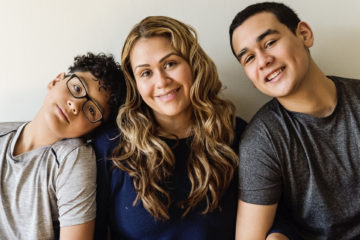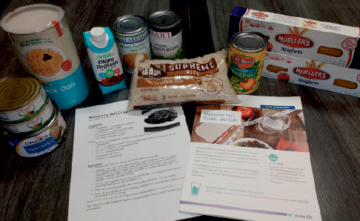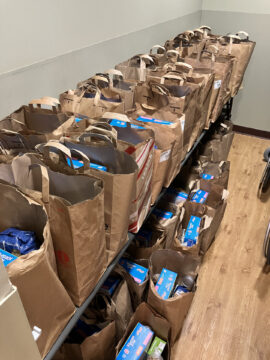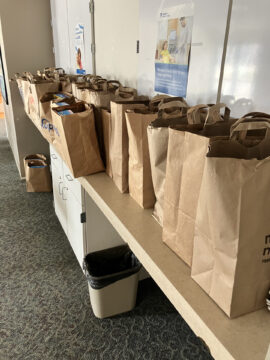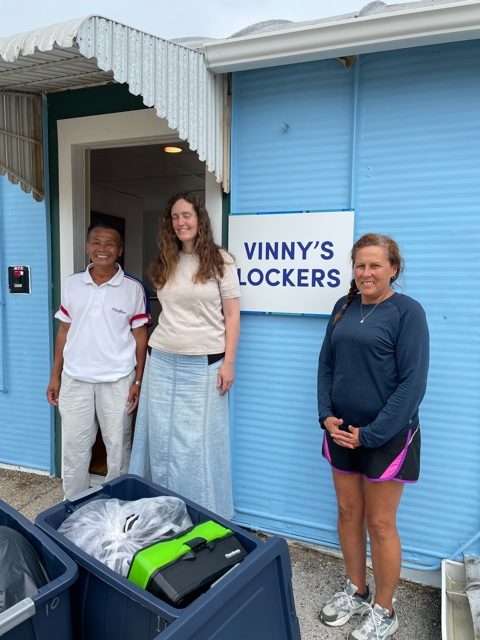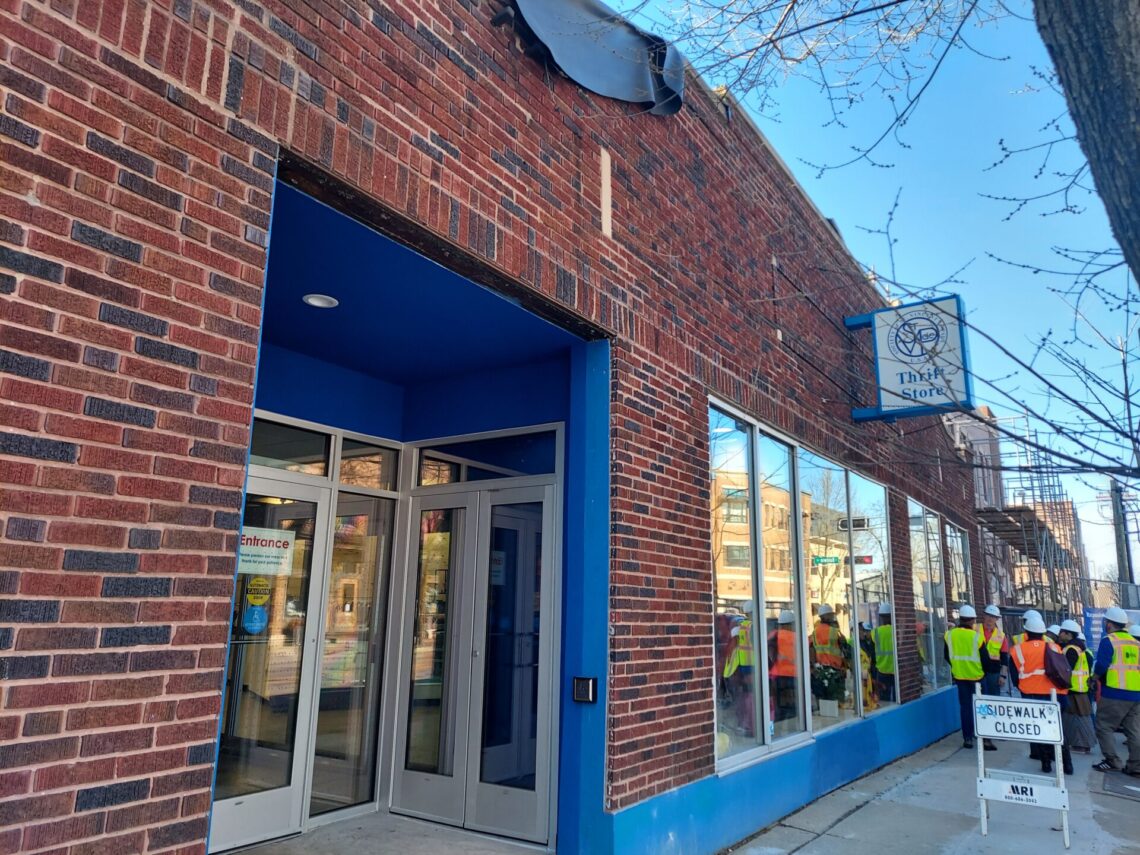It’s a bright sunny afternoon in late October as Kamaria* finishes her work day as a caregiver. She smiles, says hello when I walk up to her car to chat. Yesterday included two shifts, one for each of her employers, 12 hours in total. She is tired.
“Caregiving is a hard job,” Kamaria says. “But it’s good. If people didn’t like it, they wouldn’t do it.”
Kamaria’s third job is being a mom to three teenagers. Her youngest is 14.
“I am so busy, they keep me on the run,” Kamaria says.
Her final stop before going home is the St. Vincent de Paul Food Pantry.
“I have been coming to the pantry for a long time,” Kamaria explains. “It helps, it really helps. Especially now with how expensive food is.”
Increased need for food
As pantry staff member Ashleigh loads Kamaria’s groceries into her front seat, she smiles and laughs that her kids can help her unload once she gets home. The boxes and bags are heavy with fresh produce and pantry staples. Cooking oil and other baking items are particularly bulky and hard to afford on her budget.
“The kids eat all of the food, they can unload it,” Kamaria laughs. “I cook healthy food all of the time. My kids love fruits and vegetables. Anything fresh.”
The rising prices of food, gas and utilities are hurting her ability to care for her children. She gets food from the pantry to be able to afford other bills.
The St. Vincent de Paul Food Pantry is open four days a week to provide groceries to families and individuals. Each month since May of this year an increasing average number of households have turned to the pantry for help with food. Rising costs hit people with limited incomes the hardest forcing them to make hard choices and adding stress to their lives.
A blessing of time and convenience
Kamaria struggles to find time to balance all of the demands of her day: working two jobs, managing a household and raising three hungry teenagers. She uses Pantry2Home (formally PantryPal), the online food ordering system. She credits the resource as a game-changer for her family.
“The online order has been good. I come home from work and don’t have time to wait in line and have to go right home and cook,” Kamaria says. “A friend from work told me about this service. I am so glad I learned about this.”
Placing an online order relieves the burden of time from families stretched thin, allows them to choose exactly which pantry items they need, reduces food waste and offers greater flexibility for cultural preferences and dietary restrictions. Online orders are easy to make for people using the pantry. They visit the Food Pantry page of our website and click the Pantry2Home button to place an order for pickup, or the DoorDash button to place an order for delivery.
Currently, about 20 families place and pick up orders each Monday, Tuesday and Friday. On Thursday, that number exceeds 50 families as DoorDash drivers deliver the orders to 25- 40 families, in addition to those who choose to pick up their orders. Pantry staff and volunteers work hard to pack all of these orders while still managing the drive-through pantry service. Your generosity fed an average of 145 households each pantry day last month.
“You guys do wonderful things. I don’t like to waste food and with the online ordering I can choose exactly what I know my kids will eat,” Kamaria reaffirms.
Kamaria relies on the St. Vincent de Paul Food Pantry to feed her family and give her hope. Your care for and generosity to her and thousands of neighbors like her is tremendous. You make moving forward together in hope possible.
*Name changed to maintain the neighbor’s privacy. Photos are representational.
Donate now to the St. Vincent de Paul Food Pantry
Read how your care, compassion and encouragement help neighbors in need. Current edition: Lent 2024
Archive
- Thanksgiving 2023.
- Summer 2023
- Lent 2023
- Christmas 2022
- Thanksgiving 2022
- Summer 2022
- Spring 2022 (Annual Report)
- Lent 2022
- Christmas 2021
- Thanksgiving 2021
- Summer 2021
- Spring 2021 (Annual Report)
- Lent 2021
- Christmas 2020
- Thanksgiving 2020
- Spring 2020 (Annual Report)
- Lent 2020
- Christmas 2019
- Thanksgiving 2019
- Fall 2019
- Summer 2019
- Spring 2019 (Annual Report)
- Lent 2019
- Christmas 2018
- Thanksgiving 2018
- Spring 2018 (Annual Report)
- Lent 2018
- Christmas 2017
- Spring 2017 (Annual Report)
The men of Port St. Vincent de Paul recently planted a “rain garden” as part of The Roger Bannerman Rain Garden Initiative.
The City of Madison Engineering Division established the program and hopes residents will help it reach its goal of 1,000 rain gardens! Port St. Vincent de Paul is proud to be one garden growing that possibility! Rain gardens help reduce runoff on the Isthmus and keep our lakes clean.
At the Port, several men planted a variety of flowers and wildflowers and installed a ‘bee barn” to help our local pollinators thrive. The Port vegetable and flower gardens are pretty popular during the summer months, and the new gardens give program participants an opportunity to unwind and relax while they are seeking a fresh start.
St. Vincent de Paul conferences at Blessed Sacrament Parish, Immaculate Heart of Mary Catholic Church and St. Maria Goretti Catholic Church generously provided funds and plants for the garden. Lacy Garden leader, Tom Parslow, graciously lended his expertise and equipment to help plant the garden as well. 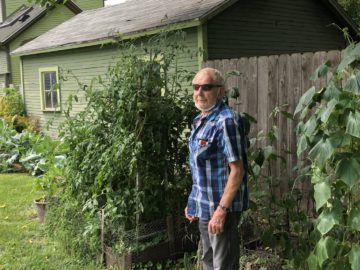
Will you consider growing your support for Port St. Vincent de Paul?
With a monthly gift, you can invest in the ongoing maintenance and care of our men’s housing program. Thank you!
Increasing food prices mean higher client numbers at our Food Pantry, and people come however they can.
As he loaded cans of soup, a bag of apples and oranges, frozen meat, cheese, yogurt containers and a gallon of milk onto his bike, Geoff* explained how much the St. Vincent de Paul Food Pantry means to him. “It’s a huge blessing. A blessing of food which goes a long way,” Geoff said. “All of these people out here to help, it’s amazing!”
It is a cold, cold “Wisconsin spring” day. It’s windy outdoors in the parking lot. A mix of snow and rain falls heavily. Still, staff and volunteers at the St. Vincent de Paul Food Pantry are loading vehicles with food and personal-care items as they have, regardless of the weather, for the past two years. Cars frequently begin lining up 45 minutes before the pantry opens. Once they reach the front of the line, it takes just minutes for staff and volunteers to load trunks or backseats with boxes of food. Clients make special requests – no meat, skip the bread, just produce this week – but most take the full 75-pound allotment.
Most people coming through our Food Pantry receive about 75 lbs. of food (right). Your gift will help Geoff and other clients get the food they need, donate here today. Thank you!
Since the beginning of April, our food pantry has averaged 104 households per pantry day. The current record-high number of households in one day for this year is 158. These are numbers more typically seen around Thanksgiving and Christmas times. Staff and volunteers load a vehicle every minute and a half on the busiest days.
Vehicles aren’t the only way people retrieve their groceries and come through our outdoor drive-through service. Geoff, a pantry client this past year, rides his bike to and from our pantry. Other pantry users ride the bus, using backpacks or shopping bags to carry their food home. A friend referred Geoff to St. Vincent de Paul. He’s been a regular at the pantry for the last year. Especially due to the pandemic and inflation, access to free food has helped him pay other expenses and bills.
Inflation means food and other goods are expensive. Everyone feels this. Those who lack transportation face an added burden. Geoff cannot drive but manages the best he can by using a bike carrier to get his groceries home. Heavy items go on the bottom, bread on the top and anything else he can carry in two backpacks on his back. A supply of toilet paper, toothpaste and other personal-care items hang from his bike’s handlebars.
“God blessed us with this food and with this pantry. It’s amazing with such nice volunteers and staff,” Geoff said. “Food is expensive, rent is expensive, and this helps to cover other expenses like my rent and utilities. I can’t thank you enough.”
*Name changed for privacy
St. Vincent de Paul Charitable Pharmacy staff continue to provide health information to patients on receiving their COVID-19 vaccines
St. Vincent de Paul Charitable Pharmacy staff and volunteers provide COVID-19 vaccines and health information to “hard-to-reach” people who have been hesitant to receive a vaccine. Staff pharmacists Becky Mann and Yolanda Tolson- Eveans share stories of patients they have talked with and educated about the importance of receiving their COVID-19 shots. In some cases, folks were current pharmacy patients and asked if they would like to receive a vaccine and initially said no. After explaining the benefits, talking about their concerns and sharing information, several patients received their vaccine with a resounding, “Yes, please!”
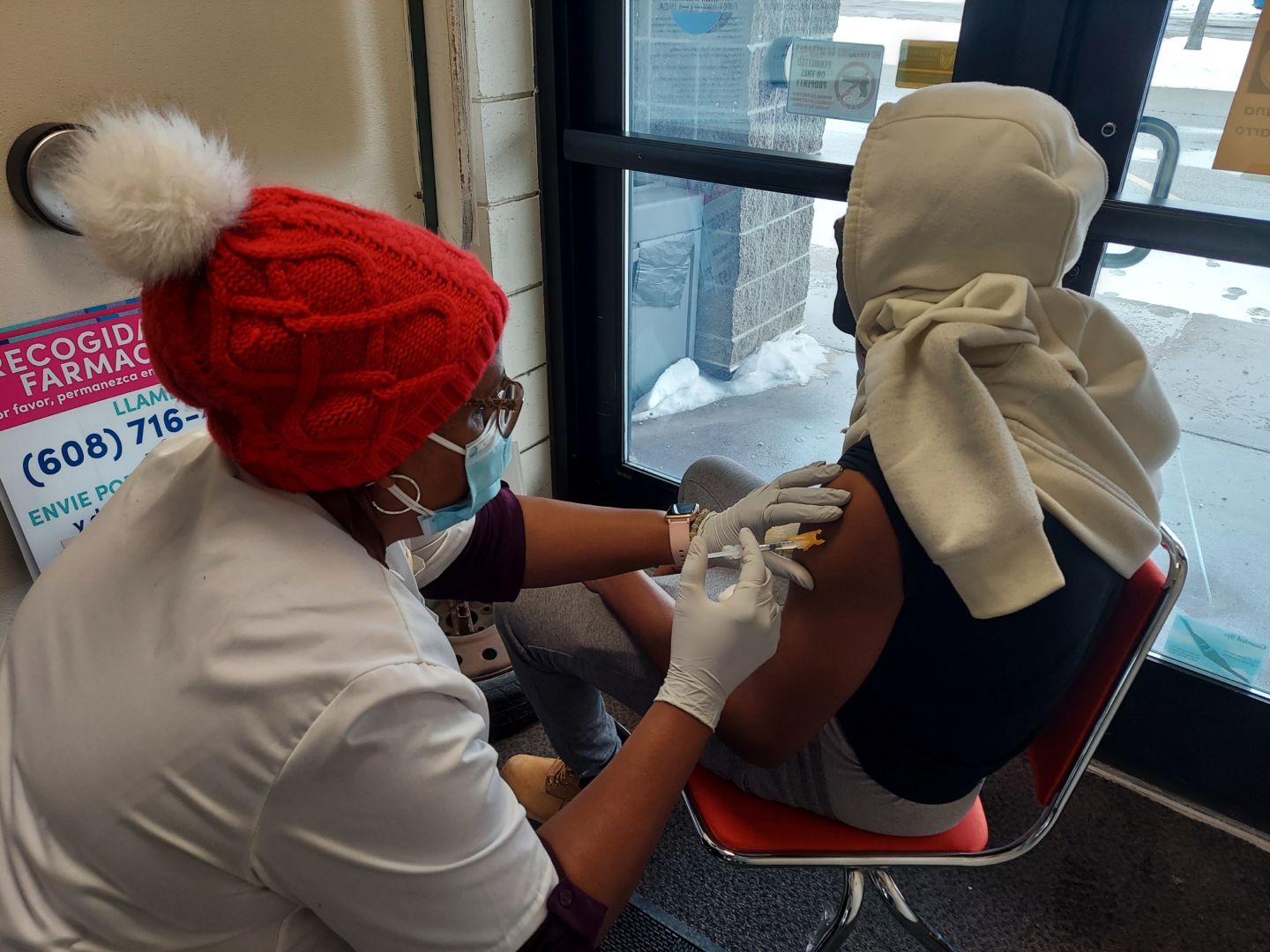
In one instance, a patient accompanied a family member while he received his vaccine. Several weeks later, that patient decided to follow up with our pharmacy and came to receive his own vaccine. In another case, staff offered a patient a COVID-19 shot and discussed his concerns. At that time, the patient declined, but several months later when the opportunity arose, he had re-considered due to the positive conversation and helpful information our staff shared.
Many of our patients face barriers to receiving healthcare: transportation, information only provided in English and lack of internet to access resources. Our pharmacy consistently helps patients overcome these barriers. Through Uber Health, we can offer patients a free ride to and from our pharmacy. Our volunteer interpreters allow staff to engage with Spanish-speaking patients. We offer a variety of ways to sign up for an appointment and retrieve medications. We advertise our standing as a free public resource on several platforms.
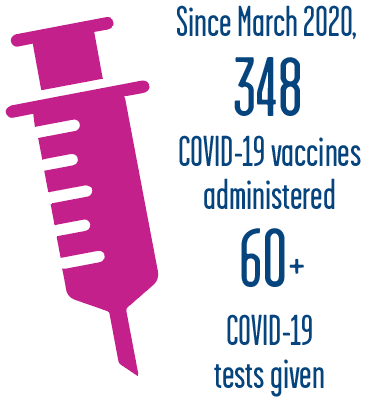 Our vaccination clinics have increased awareness of our pharmacy. As the only free-standing charitable pharmacy in Wisconsin, we are not connected to or supported by any single healthcare organization. The more people who are aware of us, the more patients we can help and the healthier our community can become.
Our vaccination clinics have increased awareness of our pharmacy. As the only free-standing charitable pharmacy in Wisconsin, we are not connected to or supported by any single healthcare organization. The more people who are aware of us, the more patients we can help and the healthier our community can become.
If health care assistance is important to you, please consider supporting our pharmacy with a financial donation. Reach out to Eric Fleming, Director of Development, at (608) 442-7200 x34 to discuss how an individual or business can assist with our pharmacy needs.
Jill* found our food pantry one year ago while driving through town. She uses our new online food-ordering system, Pantry Pal, to select and pick-up her canned goods, meat, fresh produce, dairy and bakery.
“The online ordering system is less wasteful than receiving items I might not be able to use,” Jill said. “I can chose exactly what I want.” Jill also brings food to an elderly neighbor.
Pantry Pal was developed by Laura Mendyk and Julie Eichhorn. The current system is an online form, but the pair is developing a mobile app for food pantries. “Pantry Pal is incredibly honored to partner with St. Vincent de Paul to trial and build a platform that will simultaneously make acquiring food easier for those who need it and support the operations of the pantry. We appreciate the support of Chris Kane, Jenni Troia and Josh Hittesdorf (pantry staff) and their willingness to collaborate and engage in this journey with us,” Mendyk said.
“The food ordering system allows me to spend my work money on other bills and not have to worry about food. A lot of people feel shame asking for help, but sometimes you just need help. I am not afraid to ask,” Jill said.
*Name changed for privacy
Moises and Rosa have been long-time St. Vincent de Paul—Madison clients. On one September afternoon, the couple visited the Food Pantry and Charitable Pharmacy using our newest service, a free Uber ride!
Thanks to a partnership with Project Finish Line, our Charitable Pharmacy is proud to offer patients free rides to and from their COVID-19 vaccinations. As transportation is a common barrier to receiving healthcare, offering free rides increases the pharmacy’s accessibility.
The couple’s afternoon began with a phone call from a pharmacy volunteer in their preferred language, Spanish. The volunteer confirmed the plans that Uber would pick up the couple and bring them to St. Vincent de Paul. Upon arrival, the car first accessed the drive-through Food Pantry and was loaded with fresh produce, bakery, meat, eggs and pantry staples.
Talking with a volunteer pharmacist, the couple checked into the pharmacy and awaited Moises’ prescriptions. After discussing his current health, Moises received his flu vaccine. In previous weeks, the couple were one of dozens of patients to receive their first and second doses of a COVID-19 vaccine through our pharmacy.
In talking with the couple, volunteers heard that their granddaughter had been sleeping on the floor. Was the couple aware St. Vincent de Paul provides furniture vouchers? Staff contacted the couple the next morning to connect them with a furniture voucher so their granddaughter could receive an air mattress.
Throughout the afternoon a pharmacy volunteer provided Spanish translation for the couple to ensure they received the correct information. Another pharmacy volunteer brought Moises his prescriptions. With photos and diagrams, she explained each medication and any new changes. The bottles contained instructional stickers in Spanish and clear patient guidelines.
After receiving a flu vaccine, after loading the car full of pantry staples, after receiving essential medications, after talking with staff and volunteers about their current situation, the couple went back into the Uber to head home.
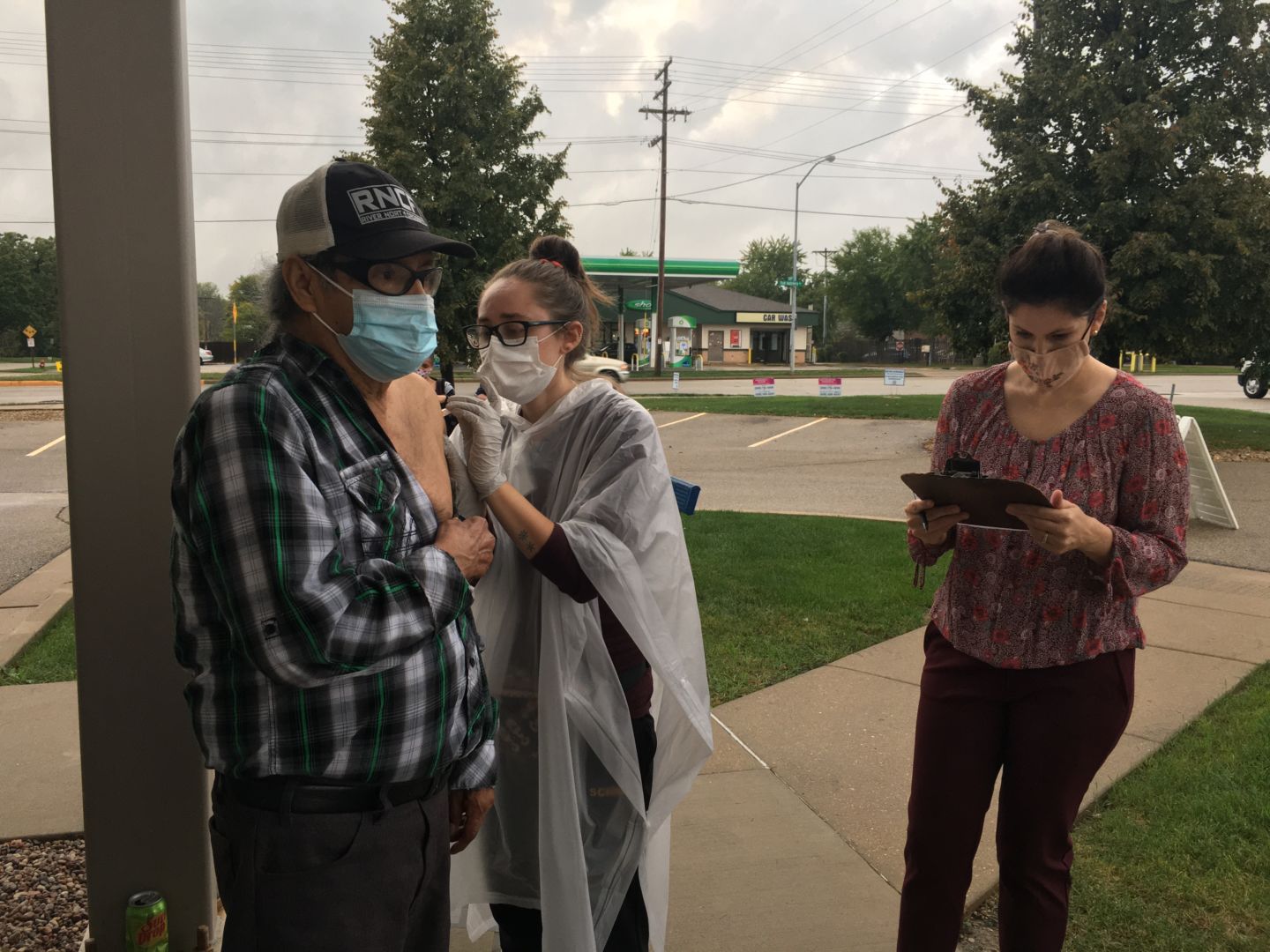
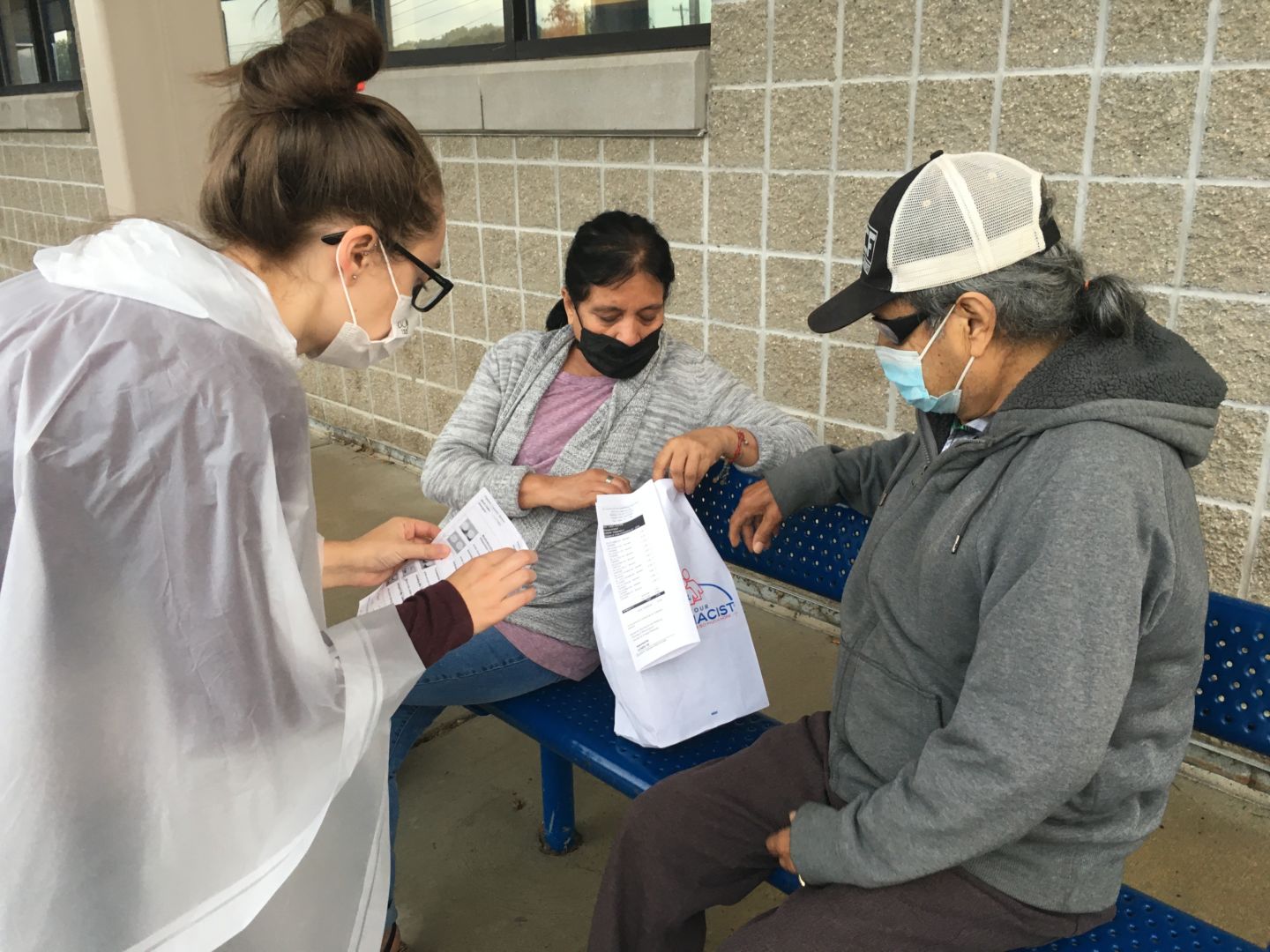
Since May, the St. Vincent de Paul Food Pantry has delivered free, renal-diet-friendly foods monthly for 50+ patients, who have failing kidneys.
Berkley French identified a need. She reached out to St. Vincent de Paul — Madison who helped her and Fresenius Kidney Care find a solution for dialysis patients at their Fitchburg clinic.
“Many of our patients face barriers ranging from fatigue (12+ hours of treatment every week), transportation and physical mobility difficulties, limited diets. Most do not have jobs,” Berkley said. “The St. Vincent de Paul Food Pantry is able to provide foods that support healthy kidneys and deliver it right to our patients at the clinic.”
“When Berkley reached out, we said, ‘Absolutely, let’s make this happen,’” said Chris Kane, St. Vincent de Paul — Madison Director of Client Services. “This is a great way to literally help our neighbors in need.”
“This has been awesome to see and very impactful,” Berkley added. “Hopefully, we can continue to learn our patients’ needs and also expand to our sister clinic in the future.”
Goods storage for people experiencing homelessness returns after fire last fall
Vinny’s Lockers 2 opened in July, following a building remodel project to replace the original Vinny’s Lockers, which was lost to fire last November. This program, the only one of its kind in Dane County, provides long-term storage of goods for people experiencing homelessness.
The original Vinny’s Lockers building was demolished and removed after the fire. St. Vincent de Paul facilities staff spent months remodeling a building on the same site to suit the needs of the program.
Clients using Vinny’s Lockers often store items such as off-season clothing, tools or household goods. People who lost goods in the fire last fall received St. Vinny’s Thrift Store vouchers and box store gift cards to replace their belongings.
“It was a great relief to have a place to store my things when I was homeless and jobless,” said Marco*, who had made use of Vinny’s Lockers. “It allowed me to save some important documents and was a safe place to save some of my valuable items. Vinny’s Lockers helped me a lot.”
To learn more, please visit: Vinny’s Lockers
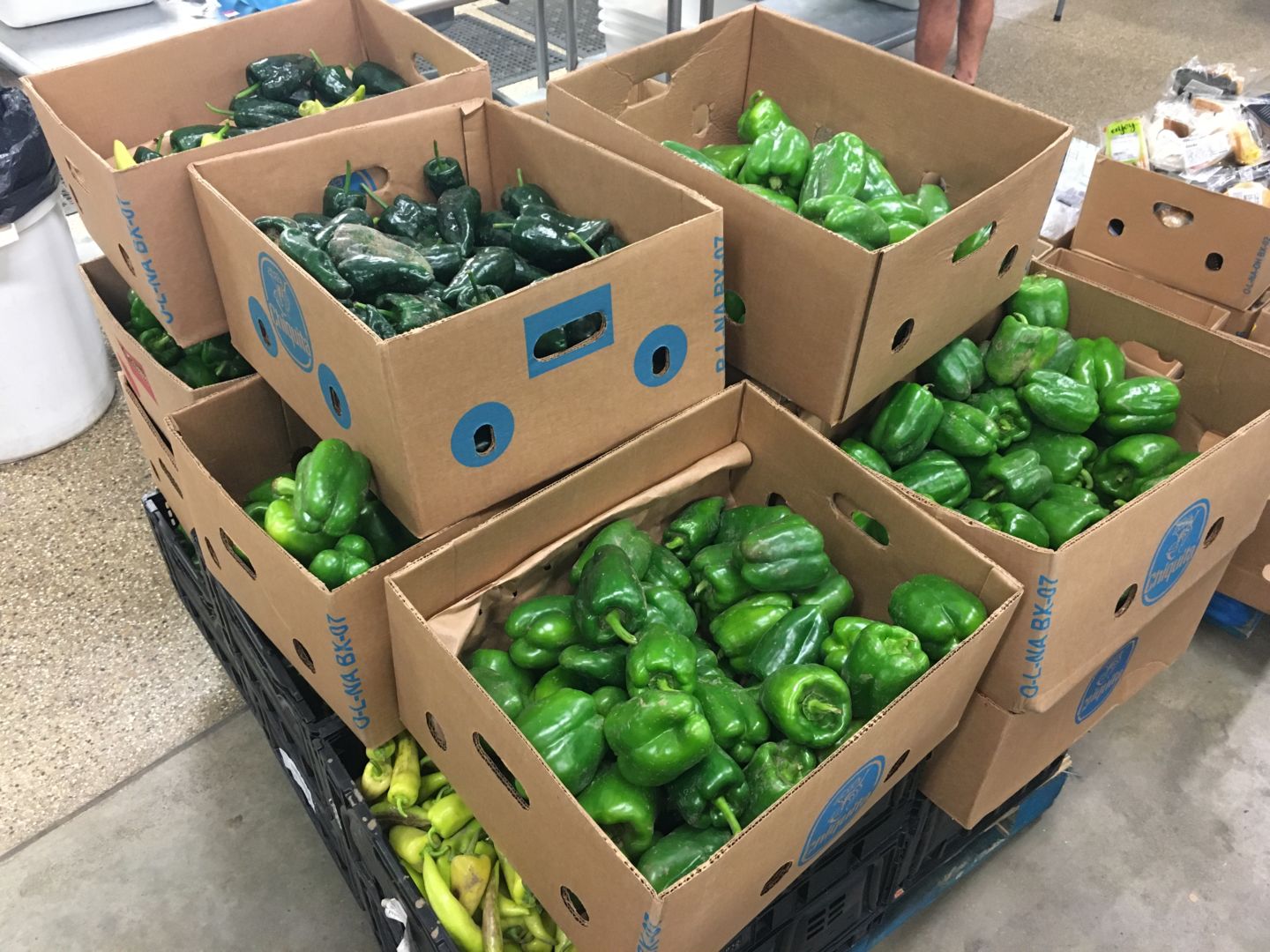 Volunteer-run Lacy Garden fosters community, promotes healthy living
Volunteer-run Lacy Garden fosters community, promotes healthy living
St. Vincent de Paul Food Pantry shopper Donna delighted in the variety and freshness of vegetables she received during a recent pantry visit. “My family loves the tomatoes best,” Donna noted. “And it’s fresher than what I could get at the grocery store!”
Fresh is correct. Cabbages, broccoli, beans, tomatoes and more are grown at the Lacy Food Pantry Garden in Fitchburg. The vegetables arrive at the pantry the evening of their harvest and are distributed to clients within a day or two. The Lacy Garden, one of several food pantry gardens in Dane County, produces an average of about 18,000 pounds of fresh vegetables for the food pantry each year. It is the only pantry garden that provides produce exclusively to the St. Vincent de Paul Food Pantry.
The Lacy Garden is run entirely by volunteers, with hundreds of individuals planting, weeding, watering and harvesting each year from April through October. Some volunteer as individuals or family groups; others come from area businesses or schools to work together for a good cause.
“My affiliation with Lacy Garden has been deeply satisfying,” said Peg O’Donoghue, Volunteer Coordinator for Lacy Garden. “It is a story of ingenuity, generosity and community.”
“Co-founders Ken Witte and Emmett Schulte devised a way of bringing nutritious produce to local food pantries nearly 25 years ago. Generosity from Phil and Winnie Lacy who donated farm acreage for cultivation 22 years ago, continuing to today. And it is community-built by volunteers, those who have served for many years and those who are just finding the Lacy Garden,” said O’Donoghue.
“It is a privilege to witness God’s Blessing each year,” affirmed Tom Parslow, Garden Leader. “And to watch these small seeds emerge, grow and mature into nutrient filled produce is a true miracle.”

